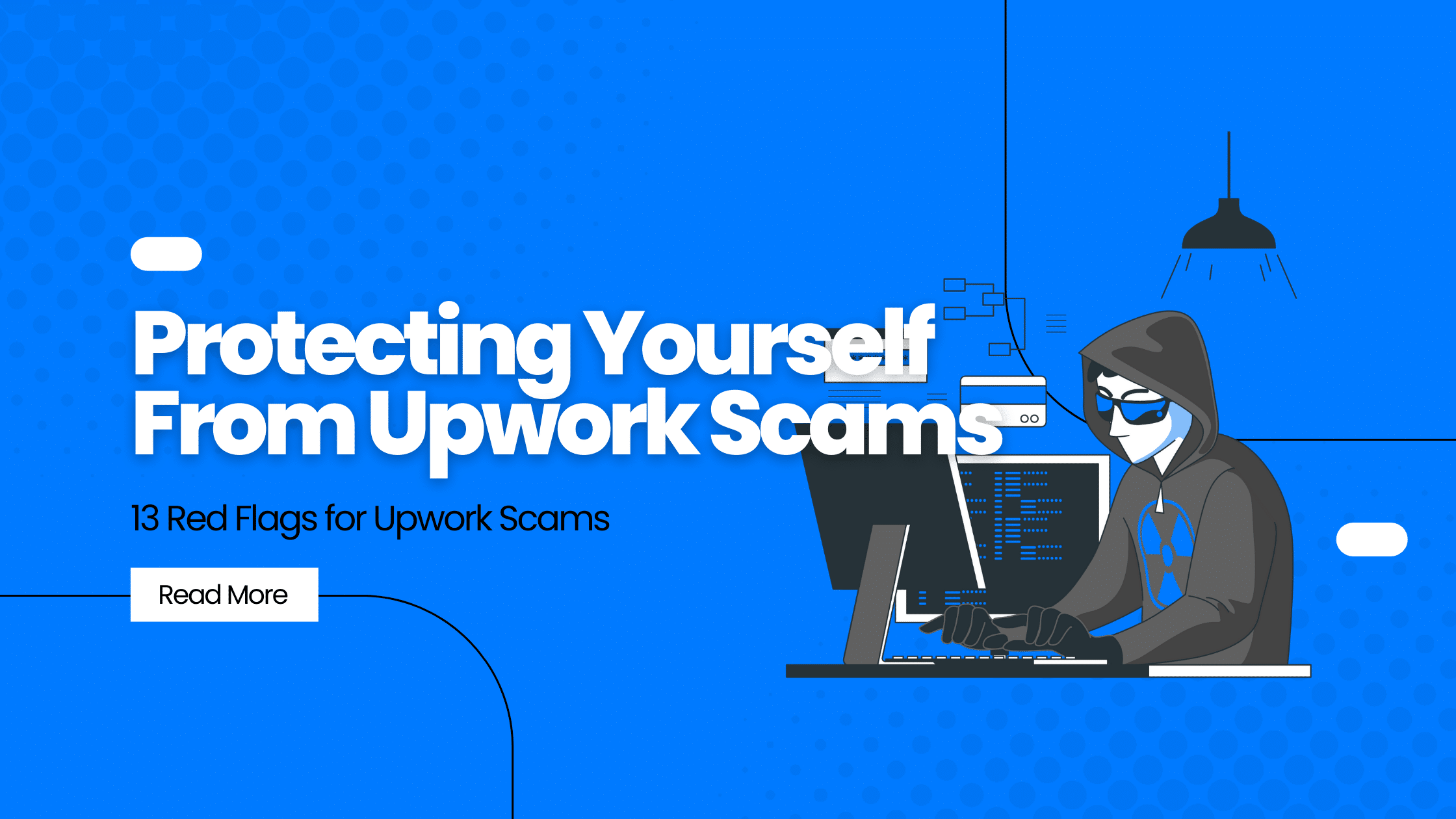It’s no secret that Upwork is a great place to find freelancing work. But it’s also a place where scam artists can easily prey on unsuspecting freelancers.
This article will discuss 13 red flags to watch out for when vetting potential Upwork clients.
What are Upwork scams, and how can you protect yourself from them
Scams are common on any freelance platform, but they can be especially prevalent on Upwork. There are several ways to protect yourself from Upwork scams, however.
The first step is to be aware of the signs of a scam.
Often, scammers will attempt to rush you into working with them before you can thoroughly vet them and their project. They may also ask for personal information upfront or request that you pay for something related to the project before they have paid you.
If you are ever unsure about a client or a project, take some time to do your research. Look for client reviews online, and see if other freelancers have had positive experiences working with them. You can also check if the project budget and scope are realistic.
By following these steps, you can help protect yourself from Upwork scams.
13 red flags to watch out for when vetting potential Upwork clients
1. The client asks for your ID upfront.
When a client asks you for your ID upfront, it’s usually a sign that they are up to no good. This is because legitimate clients don’t need to see your ID to verify your identity.
Upwork should have already done this.
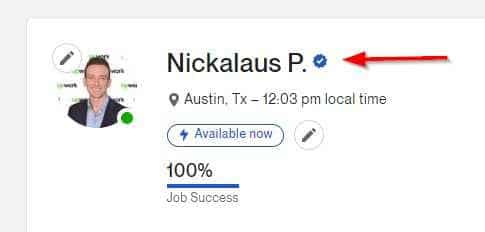
The client may be looking for personal information that they can use to steal your identity or that they plan to scam you out of money.
2. The client asks you to deposit money into their account to buy supplies or other costs related to the project.
When a client asks you to deposit money into their account for supplies or other costs related to the project, it’s usually a sign that they will scam you. This is because legitimate clients don’t need you to pay for supplies or other costs upfront. Instead, the client may be looking for a way to steal your money.
3. The client is very insistent on starting the project immediately before you have a chance to do due diligence.
When a client is very insistent on starting a project immediately, it’s often a sign that they rush to screw you over. This is because scammers usually try to rush you into working with them before you have a chance to do due diligence and research them and their projects.
If you are unsure about a client or a project, it’s always best to take your time and do your research before starting to work.
4. The client does not have any reviews or ratings on their Upwork profile.
When clients do not have any reviews or ratings on their Upwork profile, it’s often a sign that they are not who they say they are. This is because legitimate clients will usually have at least some reviews or ratings on their Upwork profile.
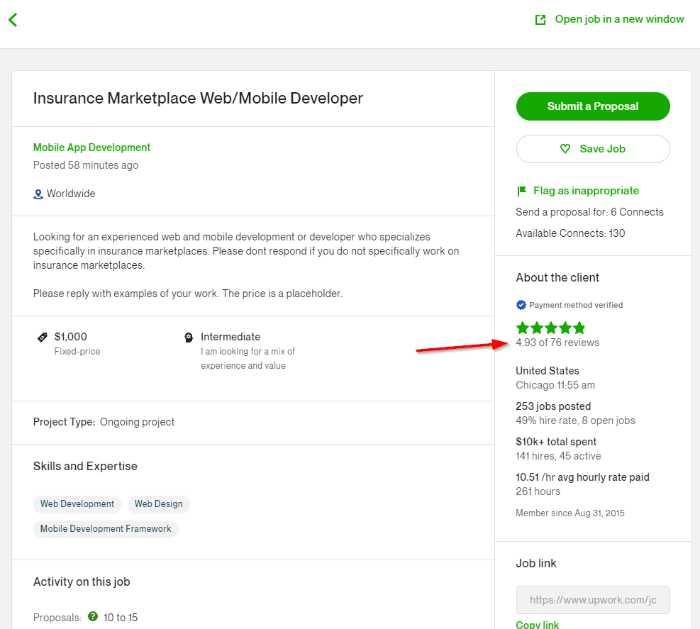
It’s possible that the client is new to Upwork and doesn’t have any reviews yet, but it’s also possible that they are a scammer who is trying to hide their identity.
5. The client’s Upwork profile is new and has no activity besides messaging you.
When a client’s Upwork profile is new and has no activity besides messaging you, it’s often a sign that they are spinning up new accounts to scam people. This is because it’s unusual for legitimate clients only to contact you and not have any other activity on their profile.
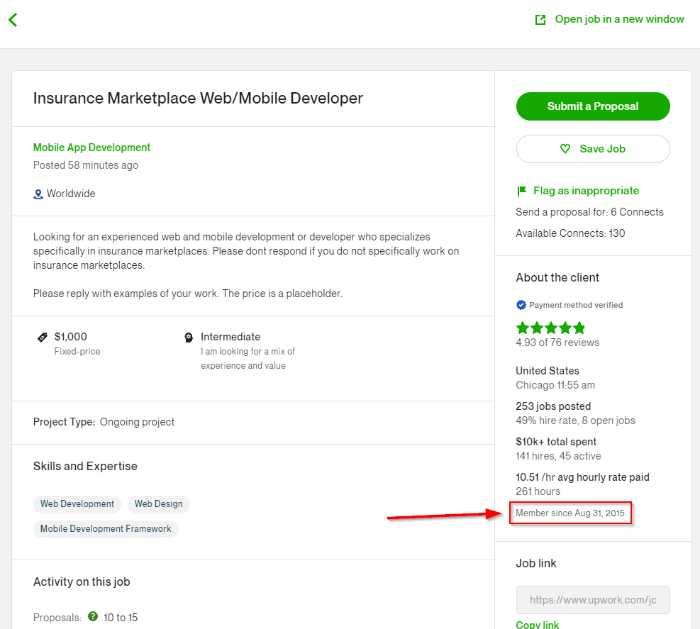
It’s possible that the client is new to Upwork and is just looking for their first project, but it’s also possible that they are a scammer who is trying to rip you off.
6. The project budget is very low (or high) compared to the scope of work required.
When the project budget is very low (or high) compared to the scope of work required, it’s often a sign that the client is trying to entice high-quality proposals.
This is because scammers often try to lowball (or highball) you on the budget to get you to agree to the project. Therefore, it’s essential to be aware of your worth and not agree to work for a budget that is too low (or too high).
7. The client refuses to provide any additional information about the job description beyond what is in the initial job posting.
When a client refuses to provide additional information about the project beyond what is in the initial job posting, it’s a sign that the client is up to shady. For example, the client may be a scammer trying to lure freelancers into working on a project without knowing what the project is. Or, the client may be inexperienced and not know how to communicate. Either way, it’s best to steer clear of these clients or demand clarification.
8. The client is based in a country known for high rates of Upwork scams.
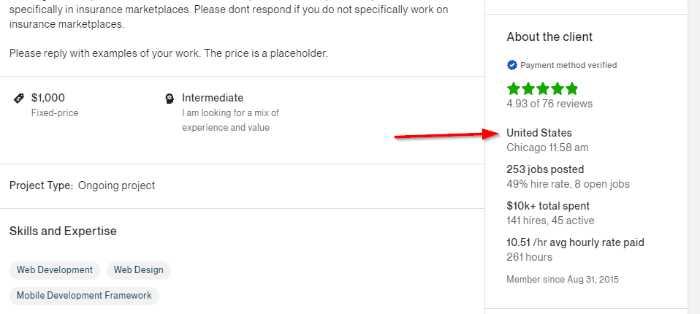
When looking for work on Upwork, it’s essential to be aware of the countries known for high rates of scams. For example, clients from Nigeria, Ghana, and Pakistan are often associated with scams. If you’re unsure about a client, do some research online or consult with other freelancers who have experience working with them.
9. You cannot find any information about the client online, even after extensive searching.
It can be challenging to determine whether or not a client is legitimate, especially if you cannot find any information about them online. However, you can take some steps to protect yourself from Upwork scams.
First, try to find as much information about the client as possible. Check for reviews online, or contact previous clients to ask about their experience. If you cannot find anything, be wary of working with the client.
Second, always use a secure payment method when working with clients. Paypal is a good option, as it offers buyer protection in case of Upwork scams.
Finally, trust your gut. If something feels off about a client, or you have a bad feeling about working with them, it is probably best to move on.
You can protect yourself from Upwork scams and avoid losing money to scammers by following these tips.
10. The client doesn’t have a verified payment method.
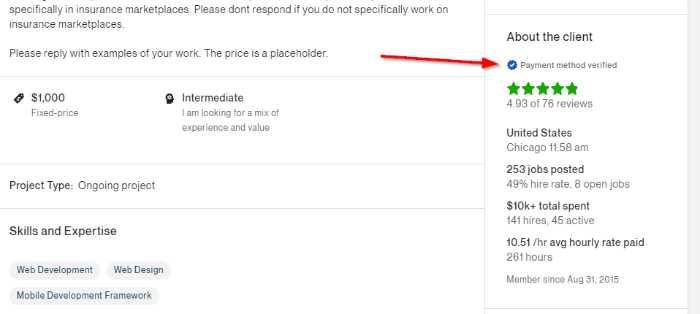
Upwork has several features to help freelancers avoid scams, the most important of which is the payment verification system.
When a client has a verified payment method, Upwork has verified that the payment method is legitimate and that the funds will be transferred to the freelancer’s account.
If you’re working with a client who doesn’t have a verified payment method, there’s a greater risk that they may not pay you for your work.
If possible, only work with clients who have a verified payment method. If you must work with a client who doesn’t have a verified payment method, get the total amount of money upfront before starting work.
11. The client is asking for work to be done outside of Upwork.
When a client asks you to do work outside of Upwork, it’s often a sign that they’re up to something fishy. It’s infrequent for a legitimate client to ask for work to be done outside of the platform.
If a client asks you to do work outside of Upwork, it’s best to exercise caution and either decline the job or ask for more information about why they’re making this request. Remember, this is against Upwork terms.
12. The client’s average hourly pay is meager, or they ask for free work
One of the giant red flags is when a client’s average hourly pay is meager. This could be a sign that they’re trying to take advantage of you, so be careful.
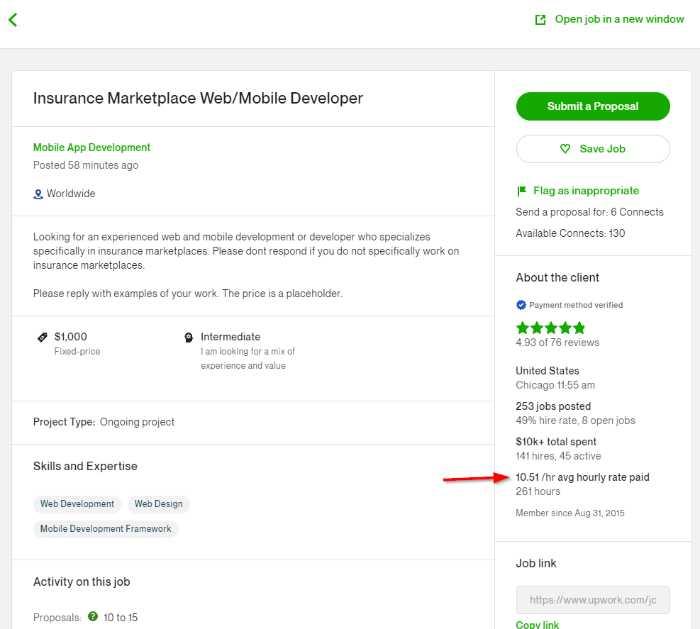
13. The client is asking for unrealistic deadlines.
When a client asks for an unrealistic deadline, it’s often a sign that they’re trying to induce urgency, so you make a poor judgment. On the other hand, a legitimate client will understand if you can’t meet a tight deadline and won’t pressure you.
If a client is asking for an unrealistic deadline, exercise caution and ask for more information about why they’re making this request. Then, if possible, try to negotiate a more realistic deadline.
If you see any of these red flags, proceed with caution. It is always better to be safe.
How to report Upwork scams
Report it immediately if you think a client may have scammed you on Upwork. You can do this by clicking on the “Help & Support” link on any Upwork page.

Upwork will investigate the situation and take appropriate action against the client if necessary. Reporting a scam is the best way to help protect yourself and other freelancers from being scammed in the future.
What to do if a client has scammed you on Upwork
If a client has scammed you on Upwork, there are several steps you can take to protect yourself and try to get your money back.
First, report the scam to Upwork (see above). They will investigate and take appropriate action against the client if necessary.
You can also file a complaint with the FTC. The FTC accepts complaints about Upwork scams and other types of internet fraud.
You can also try to get your money back through PayPal’s dispute process. For example, if you paid the client through PayPal, you might be able to file a dispute and recover your funds.
Finally, you can contact your local law enforcement and file a police report. This is especially important if you have lost a large amount of money to the scammer.
Common Upwork Scams
Common Upwork Scam #1 – Fake check
Check scams are still a problem at the moment.
The prospective clients may then send you the payment of an expense. The money may be transferred via Gift cards back to the client.
When a bank returns the check as fake, your money has already been spent, and your account is in the negative.
Common Upwork Scam #2 – Gift Cards
The second most common scam on Upwork is when a client offers to pay you with a gift card. Again, this is usually a sign that they’re up to something fishy, so steer clear.
If the client offers to pay you with a gift card, it’s best to exercise caution and decline the work.
Common Upwork Scam #3 – Tax Form
A tax form scam is a common way of stealing your money.
The scammer will ask you to complete a tax form and send them the information. They may even offer to pay you upfront for your services.
Once they have your information, they can file a false tax return in your name and steal your refund. They can also create a fake Upwork account in your name.
Common Upwork Scam #4 – Identity Spoof
The fourth most common scam on Upwork is identity spoofing. This is when a scammer uses a fake name and profile to pose as a legitimate client. They may even use stolen credit card information to pay for their Upwork account.
If you’re not sure whether a client is legitimate, do your research before.
Common Upwork Scam #5 – Remote screen share and data manipulation
One of the most common Upwork scams is when a scammer tricks you into sharing your computer screen with them, allowing them to manipulate your data. This can include stealing your passwords, credit card information, and other personal information.
To protect yourself from this scam, never give remote access to your screen to a client.
What Can You Do to Stay Safe? Our Top Tips
Ask Questions About Everything Upfront
Upwork scams can be avoided by merely asking questions before the project starts.
Many freelancers take projects that they have never seen before with little communication with the client.
Do not rely only on Upwork chat. Talk on Zoom.
The more you speak, the greater the likelihood of displaying their true colors. You shouldn’t be afraid to talk with potential clients.
Many people you meet on Upwork are completely genuine clients.
Look at the client’s project history for an Upwork Scam
Freelancers can view clients’ history just as clients can see a freelancer’s work history.
On the right of the job post, you will find the client’s reviews. That’s some good information!
You may also see feedback from other freelancers on their clients by scrolling down below the job post.
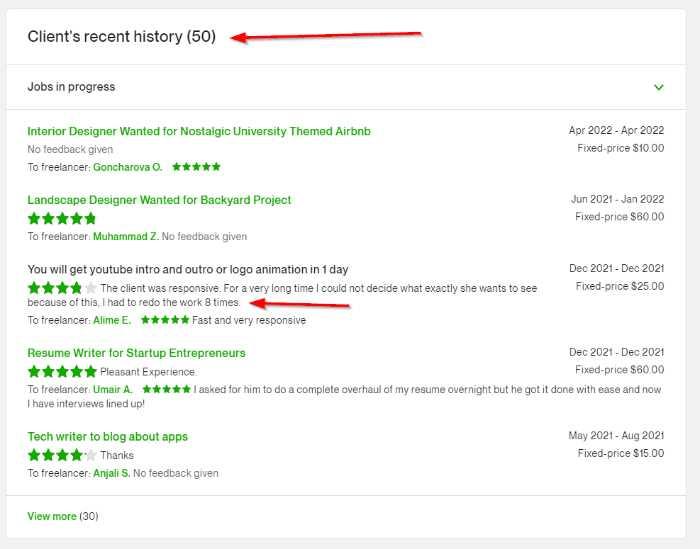
Always have a contract outside of Upwork.
You can always have clients sign the legal agreement before starting the project.
Don’t trust Upwork with the legal matters between clients.
You can have them pay it back. However, it may need legal action when the whole thing has finished. It can be hard to prove your claim with just DMs from a client on Upwork’s platform. Make sure the contract is complete, and all details are clear.
Don’t go outside of Upwork.
It’s essential to stay safe when working with clients online, and one of the best ways to do that is to stick inside the Upwork platform. Unfortunately, when you go outside of Upwork, you lose the protection of our security measures, which leaves you open to scams and other types of fraud.
To stay safe, it’s best to only work with clients you find on Upwork and never give out your personal information or payment details to anyone you meet online. If a client asks you to do either of these things, it’s best to decline and move on politely.
Following these simple tips, you can avoid Upwork scams and keep yourself safe while
Understand the role of Upwork in your Freelance Business
Firstly you should understand the role UpWork plays in a freelance company.
You have a freelance business, and when you do freelance jobs, you can own a company.
It is hard to remember this sometimes.
Upwork is simply a channel. Therefore, you need to protect yourself in the same way you watch yourself from clients outside of Upwork.
Don’t let anyone else use your account.
Sometimes we encounter people looking to log onto our account. Many times it’s someone looking to leverage a US account because they cannot get one themselves. They want more job opportunities.
A US freelancer’s identity is usually trusted much more quickly than an international one.
Keep it simple. Don’t ever let anyone into your account. Account sharing is against the rules.
For clients: How to protect yourself from freelancer scams?
Look out for these warning signs and be extra cautious.
Freelancer is asking for the project payment before accepting the offer
It is not uncommon to encounter freelancers desperate to get paid and trying to negotiate with your company before accepting a job.
While this may be a legitimate demand due to unpredictable events, it is easily possible in certain circumstances for someone to manipulate your feelings until they have gotten what they want.
We strongly recommend NOT paying a freelancer until they accept your offer.
Freelancer using a fake account
Freelancers are reportedly selling or leasing their accounts to other freelancers.
You need to watch out for this. First, conduct a video call to ensure you’re working with the person you think you are.
It can cause severe problems if you don’t trust your contractors. Many projects involve critical and confidential information.
A freelancer gave me a spun article.
If a worker submits spun articles that constitute plagiarism, the relationship between employer/employee gets damaged.
Unfortunately, there are services where people attempt to “re-write” something to do less work.
By performing a quick plagiarism scan, spun article’s contents can be detected and avoided before publication.
A freelancer asks me personal questions about my identity for verification purposes.
You shouldn’t have to provide personal information or give sensitive information to freelancers.
If you stay indie of the Upwork ecosystem, Upwork protects freelancers.
If someone asks you for a password and identifying information—get someone else.
I hired a freelancer, but their work is copyrighted
In any publication, whether in a website or a magazine, the originality of the content is the key to success.
Using freelance writing software such as Grammarly or Copyscape makes it possible to ensure the quality of submitted work.
Conclusion
Upwork, like any other online platform, is susceptible to scams.
Unfortunately, many freelancers have lost money by working with clients they found on Upwork who turned out to be scammers.
To help protect yourself from Upwork scams, it is vital to be aware of the red flags that indicate a potential scammer and know what to do if you think you’ve been scammed.
